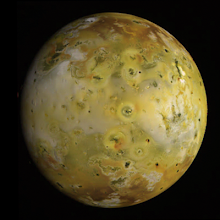Titan Features Receive Provisional Names
Goodbye "Great Britain", hello Shikoku Facula. After more than a year of using nicknames for features on the surface of Titan, features on the surface are now recieving official names. For almost 6 months, the only features that had provisional names were Xanadu, the bright region in the equatorial leading hemisphere, and Ganesa Macula, a possible pancake-dome volcano found by RADAR last October. Now a number of features seen by ISS over the last year have been given provisional names by the IAU. The process began in May when features were selected as important enough to receive names and a proposal was submitted to the IAU, the body that governs astronomical nomenclature. The process was hampered by the same problems that plague scientists, without the support of detailed compositional and topographic information on many of the features that need names, we are left with just albedo markings, which can often be ambiguous at best. So classifying features under many of the existing nomenclature categories was difficult. Such ambiguities led to the creation of several new terrain type, such as virga, which pertains to a streak or stripe of color.
Among the highlights of the new feature names include:
Among the highlights of the new feature names include:
- Shangri-la, the dark region west of Xanadu
- Shikoku Facula, the "island" shaped like Great Britain in central Shangri-la
- Mindango Facula, the "island" shaped like Ireland in central Shangri-la
- Adiri, a bright region between Shangri-la and Belet, Huygens landed on the western tip of Adiri, the T8 SAR swath will cover the central portion of Adiri
- Belet, dark region west of Adiri, the T8 SAR swath will cover the central portion of this dark region
- Ontario Lacus, the "lake" from June
- Mezzoramia, jrehling's drainage region
- Omacatl Macula, dark streak north of the "H"


0 Comments:
Post a Comment
<< Home